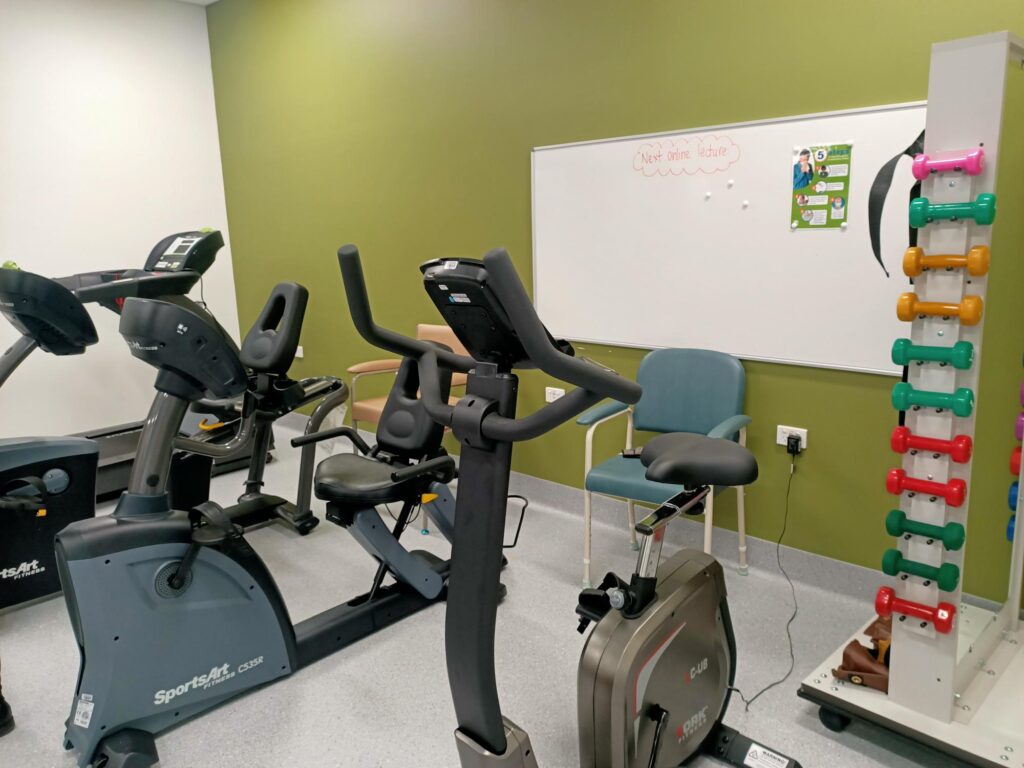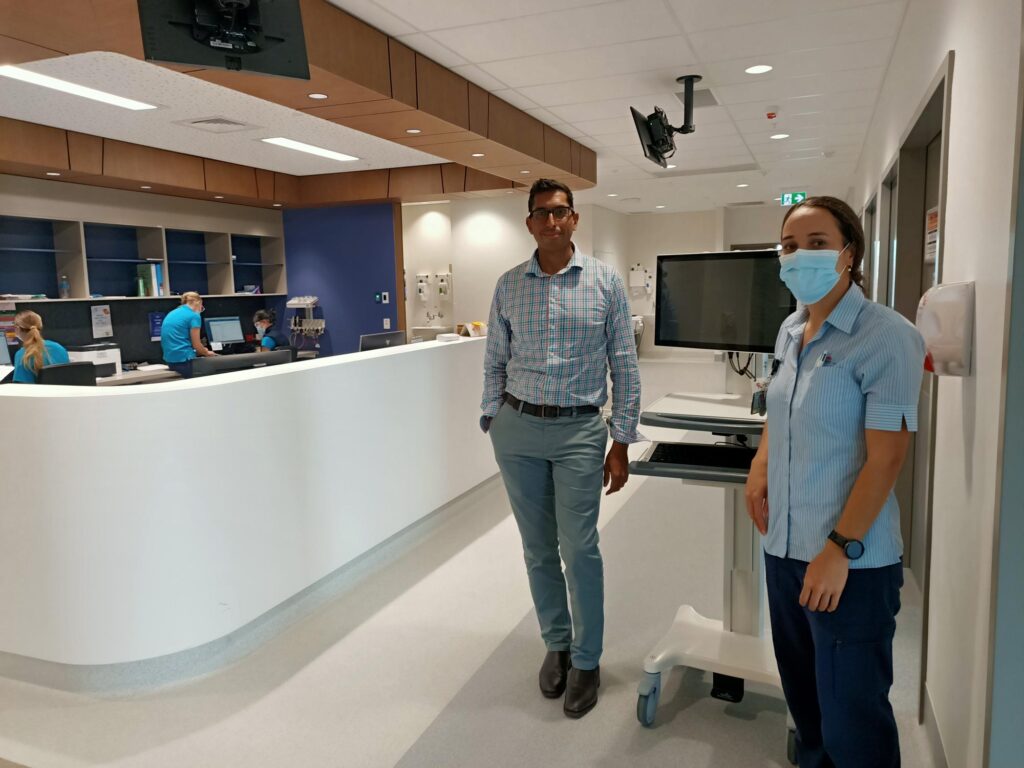
In Australia, it is estimated that there are over 210,000 people living with Parkinson’s disease1, with approximately 20% of people having symptoms before age 50 with many diagnosed in the 30s and 40s2.
The causes of this chronic and progressive neurodegenerative disorder are still unknown, and although it can neither be prevented or cured, it has been found that there are effective treatment and therapy options that can help manage symptoms better.
Despite its known positive impact on the quality of life for patients, treatment and therapy for Parkinson’s disease are often difficult to access for a large part of the population. This is because specialty services aren’t often well known or easily accessible to those living outside of central Sydney. This coupled with people not recognising symptoms or wanting to avoid long referral wait lists means diagnosis and treatment can be delayed.
No one understands this better than Dr Omar Ahmad, Consultant Neurologist and Head of Neurology at Hornsby Ku-ring-gai Hospital.
After discovering that many patients who were awaiting a diagnosis or needed follow up treatment were not receiving the care they required at the optimal time in their treatment journey, the Northern Sydney Local Health District opened the doors of the Neurology Parkinson’s Disease Clinic at Hornsby Ku-ring-gai Hospital in April 2021. The Northern Sydney Local Health District (NSLHD) – a health district that has one of the largest and fastest growing ageing populations in all of NSW.

Patients with Parkinson’s have access to a range of onsite facilities including rehabilitation gyms
“As a result of an increase in the ageing population, Parkinson’s cases in the Hornsby region are predicted to increase by 50% by 2036. It is estimated that there will be around 1,639 cases in our region alone, so we are trying to manage Parkinson’s in the district and help people living with symptoms to achieve the outcomes they want,” said Dr Ahmad.
Dr Ahmad and his team are diagnosing Parkinson’s disease in new patients, conducting physical examinations, checking medications, updating treatment plans and ensuring that patients have access to the care they need at the optimal time. As Parkinson’s is a neurodegenerative disease, having access to early interventions and treatment options at the right time is essential for high-quality patient care.
“Previously, patients who were awaiting a diagnosis or needed follow up treatment for Parkinson’s would need to wait to attend the clinic at Royal North Shore Hospital or attend a private clinic, but this service provides patients with direct access to neurologists,” said Dr Ahmad.
Having had the opportunity to implement this new model of multidisciplinary Parkinson’s care at Hornsby Ku-ring-gai Hospital, Dr Ahmad believes that the clinic and associated services have had a major impact in the way in which Parkinson’s disease is managed in the district.
“We take a multidisciplinary evidence-based approach to patient care and are fortunate to be able to provide patients with access to on-site physiotherapists and OTs who can help them establish healthy exercise habits,” said Dr Ahmad.
“It is a one stop shop for the care of Parkinson’s disease at all stages of illness and continues to meaningfully impact patient outcomes within the Hornsby region.”
As research has shown that exercise is beneficial for people living with Parkinson’s3, Dr Ahmad says that being able to provide patients with access to specialised care in the clinic has had a dramatic impact on the functional ability of patients.
“Regular exercise is linked to improved mobility, and in the clinic, we have noticed that it improves their balance and decreases their risk of falls which has a positive effect on their overall quality of life.”
Patients that attend Hornsby Ku-ring-gai Hospital are also seen by Suliana Manuofetoa, a Parkinson’s Specialist Nurse. Suliana began her nursing career nearly a decade ago, and her interest in Parkinson’s came about while nursing patients with the disease.
“I find the disease to be a particularly challenging condition for patients, but it is very rewarding to work with people every day who are managing their disease to the best of their abilities, and not letting it impact the way they live their lives,” said Suliana.
In the clinic, Suliana acts as the pivotal liaison between patients and the multidisciplinary team. She manages the complex medical and psychosocial needs of patients and says that the daily interactions she has with patients and their families are the reason she keeps wanting to come back.
Having had a handful of interactions with partners who are caregivers to their spouse, Suliana’s role goes beyond facilitating appointments with neurologists for patients as she also offers caregivers emotional support.

Dr Omar Ahmad and Suliana Manuofetoa
“It’s quite challenging for partners who are caregivers to look after their spouse – especially as the disease progresses. We had a husband and wife come into the clinic just before Christmas, and I could sense that the husband had a lot on his shoulders as the carer for his wife,” said Suliana.
“I introduced the husband to a social worker and coordinated meetings for him to meet them and receive free counselling services through Parkinson’s NSW. He and his wife are now regulars at the clinic, and one of the most satisfying parts of my role is knowing that I am part of an interdisciplinary team who can support patients and their families at every stage of their treatment.”
This is why dedicated services located in the community and for the community, need to continue to have their doors open because positive results have the power to change lives.
“By being able to provide a service in the community, for the community, we can make a huge difference to how Parkinson’s disease is managed in the district,” said Dr Ahmad.
The team at the Neurology Parkinson’s Disease clinic are committed to slowing the progression of the disease and improving the quality of life for patients with this diagnosis. A multi-disciplinary team and treatment approach is essential in order for them to achieve this.
Although the team has base level funding for specific roles, this is limited and falls short of what is required to give patients access to regular multidisciplinary services. The hope is that the team will be able to expand their multi-disciplinary function and secure ongoing funding to continue to meet the growing community need.
If you are interested to learn more about how you can directly support Dr Ahmad and the Neurology Parkinson’s Disease Clinic at Hornsby Ku-ring-gai Hospital, please click here.
Sources:
[/vc_column_text][/vc_column][/vc_row]

